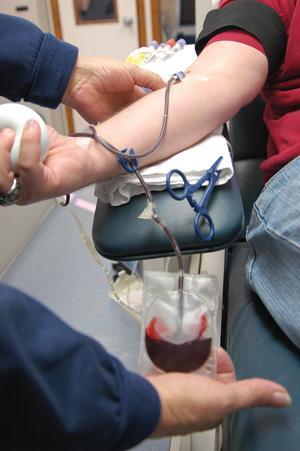Until recently, Bobby Beaird used to be a regular blood donor. Beaird, fourth-year physics graduate student, said he thinks about donating every time he sees the blood service buses on campus, but now he is barred by a regulation set by the U.S. Food and Drug Administration. The FDA prohibits men who have had sex with another man since 1977 from donating blood. The Gays, Bisexuals, Lesbians Supporters United member donated blood at Centenary College in Shreveport about six years ago. “They asked the usual slate of questions, among them, ‘Have you ever had sex with a man since 1970-something,'” Beaird said. “I forget the cut-off year exactly, but see as how I was born in 1981, the question really should have been ‘Have you ever had sex with a man, ever?'” Blood donor technicians provide potential donors with a standard questionnaire that they answer verbally in a private session. The questionnaire includes yes or no questions about the person’s sexual health, drug usage, past travel to other countries and other health-related issues. David Gremillion, director of Blood Donor Services at Our Lady of the Lake, said gay men are not denied the opportunity to fill out the questionnaire. He said several of the questions are also not gender specific. Gremillion said donors are notified of any test results important to the donor’s health, such as a positive HIV or AIDS result. Beaird said the donor technicians did not turn him away because his answer was “no” at the time. “I actually felt pretty crappy about the situation because, although I was not turned away, I know people who have been,” he said. Beaird said the question is “unfairly discriminatory.”
“Granted, I’m not the world’s greatest statistician, but I do not see how my having slept with at least one guy in my lifetime really makes me any more of a risk than the next person,” he said. “The risk of HIV increases with the number of sexual partners an individual has and with the number of less-safe sexual encounters an individual has with someone who is HIV-positive.” Beaird said he has taken HIV and AIDS tests every six months for the past year and every three months in the years before. He said he encourages everyone to get tested. His most recent HIV test was about five weeks ago. “They were negative as have all of the HIV tests I have had,” he said. Gremillion said men who have had sexual conduct with other men and present documentation that they have tested negative for HIV and AIDS may not donate blood. He said they are “deferred as a blood donor regardless of what documentation they produce.” Beaird said if the FDA wants to prevent the spread of HIV and AIDS, “they should ban donations by everyone who does not have medical confirmation of the HIV status of every sexual partner they have had.” Vickie Frederick, Our Lady of the Lake blood donor recruiter, said the hospital follows the FDA’s regulations concerning blood donation, which is a precaution against spreading AIDS and HIV. “We’re not discriminating,” Frederick said. “We just want to make sure that the person who gets this blood does not have AIDS and that you won’t get it from getting this blood.” Beaird does not think the restriction is an effective preventative measure the FDA is taking against HIV and AIDS. “Succinctly, it’s bullshit,” he said. “If they banned all groups that were higher risk categories for transmission of HIV and other [sexually transmitted infections], then I fail to see why they are collecting blood on college campuses in the first place.” Frederick said the hospital tests the blood donations for AIDS, HIV and other diseases before giving them to recipients. “It’s just that we don’t want something put into our body that’s going to harm us, and it’s a proven fact that AIDS harms you,” Frederick said.
—–Contact Angelle Barbazon at abarbazon@lsureveille.com
Donation policies questioned
March 28, 2007

At the Our Lady of the Lake medical van Jill Mcintyre, a blood donor technician, administers a needle to the arm of a University student. The vans only take one pint of blood, which can save three lives.



